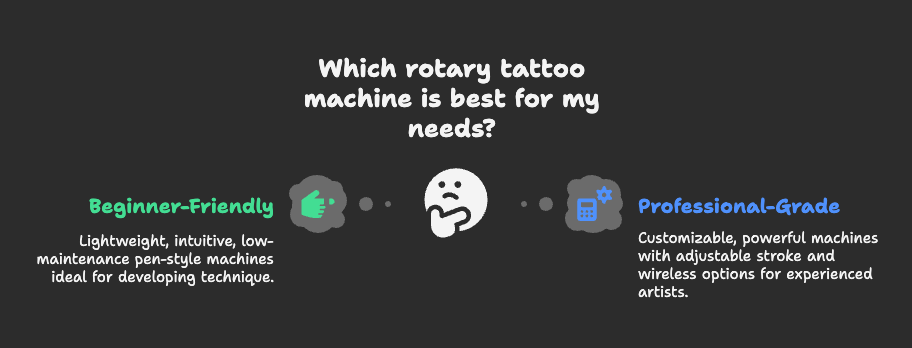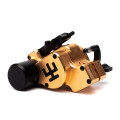Types of Rotary Tattoo Machines

Rotary tattoo machines have revolutionized the tattoo industry with their versatility, low noise, and consistent performance. Unlike traditional coil tattoo machines, which rely on electromagnetic coils to drive the needle, rotary machines use an electric motor to create smooth and continuous motion. This makes them a preferred choice for many professional tattoo artists and a great entry point for beginners.
Whether you're new to tattooing or looking to upgrade your equipment, understanding the different types of rotary tattoo machines is essential. From pen-style designs to direct drive systems, each type offers unique advantages based on your technique, skin type, and artistic goals. In this guide, we’ll break down the main rotary machine types, how they work, and which models are best suited for different needs — so you can make an informed choice without heading back to search.
Vlad Blad offers a full range of premium rotary tattoo machines trusted by professionals around the world — built with precision, power, and performance in mind.
Rotary Tattoo Machines vs Coil: What’s the Difference?
Before diving into the specific types of rotary tattoo machines, it’s important to understand how they compare to coil machines — the traditional choice in the tattoo industry.
Rotary tattoo machines operate using an electric motor that drives the needle in a smooth, consistent motion. This results in less noise, lower vibration, and a more ergonomic experience for the artist. They’re generally quieter, easier to maintain, and more lightweight than their coil counterparts. This makes rotary machines ideal for both beginners and professionals looking for versatility and comfort during long sessions.
In contrast, coil tattoo machines use electromagnetic coils to pull and release the needle in a rapid, punching motion. While they provide a distinct tactile feedback that some experienced artists prefer — especially for lining — they tend to be heavier, noisier, and require more frequent tuning.
If you're unsure which to choose, check out our full comparison in Rotary vs Coil Tattoo Machines, where we break down the pros and cons of each type in depth.
In short, rotary machines are often used by artists who value smooth shading, minimal vibration, and ease of use. They're especially popular among new and experienced tattoo artists who work across different tattoo styles and skin types.

Main Types of Rotary Tattoo Machines

Rotary tattoo machines come in different configurations, each suited for specific techniques, needle types, and artist preferences. Understanding how each type works helps you find the perfect tool for your style — whether you’re lining, shading, or packing color.
Pen-Style Rotary Machines
Pen-style rotary machines are designed to mimic the feel of a real pen, offering unmatched ergonomics, balance, and comfort. They're lightweight, quiet, and extremely smooth — ideal for long tattoo sessions or delicate, detail-heavy work.
The standout option here is the Ultron 4 Pro, Vlad Blad’s flagship wireless pen. Built with a next-generation intelligent motor, the Ultron 4 Pro delivers maximum torque with ultra-low vibration. Its adjustable stroke mechanism allows artists to switch seamlessly between lining, shading, and color packing — all while maintaining perfect consistency. This machine was engineered for professionals who demand precision, power, and performance without compromise.
For those who prefer a simpler pen format with multiple presets, the Ultron 3 is also a top-tier choice. It features three stroke lengths, 11 hours of wireless runtime, and ergonomic weight distribution — ideal for both experienced artists and confident beginners.
Pen machines like the Ultron series are widely used across the tattoo industry thanks to their intuitive feel and compatibility with cartridge needle systems, allowing for fast needle swaps and smooth results on all skin types.
Direct Drive Rotary Machines
Direct drive machines connect the motor directly to the needle drive, delivering a fast and direct hit — excellent for crisp lines and solid color packing. They’re typically low-maintenance, highly efficient, and responsive to hand speed and pressure.
One example from the Vlad Blad lineup is the Avenger 2 Pro, equipped with MultiStroke™ technology, letting you switch between six stroke modes from 3.2 mm to 5.5 mm. It’s a durable, flexible choice for artists who want mechanical precision and power in a minimalist body.
How to Choose the Right Rotary Tattoo Machine
Finding the best rotary tattoo machine comes down to your tattooing style, experience level, and the demands of your workflow. From compact pens to powerful direct drive systems, each type offers different advantages — but not all are suitable for everyone.

For Beginner Tattoo Artists
If you’re just starting out, go for something lightweight, intuitive, and low-maintenance. Pen-style machines are especially beginner-friendly thanks to their ergonomic grip, smooth performance, and quiet operation. Features like preset or adjustable stroke lengths, wireless mobility, and compatibility with cartridge needles can make a big difference when learning the craft.
The goal at this stage is to develop consistent technique — so choose a machine that lets you focus on that, rather than constant adjustments or tuning.
For Professional Tattoo Artists
Experienced artists often need greater control, stronger motors, and the ability to fine-tune performance. Whether you specialize in clean linework, color realism, or soft shading, your machine should offer customizable stroke options, reliable torque, and a build that can handle full-day sessions.
If you switch between techniques, look for a machine with adjustable stroke length and multiple modes — that kind of flexibility saves time and expands what you can offer your clients. Wireless options can also streamline your workflow by eliminating clutter and improving mobility around the client.
For a deeper dive into how rotary machines differ from coil and pneumatic systems, check out “Types of Tattoo Machines: Coil, Rotary, and Pneumatic Explained”. It’s a helpful overview, especially if you’re weighing options across categories.
Recommended Rotary Machines by Vlad Blad
If you're searching for reliable, high-performance rotary machines built for real-world tattooing, Vlad Blad offers a range of tools trusted by professionals across the globe. Here are a few standout models — each designed with precision, durability, and versatility in mind.
Ultron 4 Pro
The Ultron 4 Pro represents the pinnacle of wireless pen-style technology. With an intelligent motor that adapts to skin resistance in real time and an adjustable stroke system, it’s engineered for artists who need full control across styles — from smooth shading to bold lines. The ergonomic build reduces fatigue during long sessions, while its powerful, quiet operation ensures consistently clean results. Whether you're working black and grey, color packing, or fine-line detail, the Ultron 4 Pro is a tool that adapts to your hand and your vision.
Avenger 3 Pro
Built for professionals who prefer a punchier, more responsive machine, the Avenger 3 Pro combines a powerful M3Pro motor with Vlad Blad’s signature SkinResponse™ technology. Whether you’re packing dense color or working through tough skin, it delivers direct, stable performance with every stroke. The modular design allows for wireless or RCA operation depending on your setup.
Each of these machines is crafted to support the unique needs of modern tattoo artists — combining smart engineering with the hands-on insight of industry veterans. To explore more specs, features, and customization options, visit the Vlad Blad tattoo machine catalog.
FAQ: Rotary Tattoo Machines
What are the different types of rotary tattoo machines?
The most common types are pen-style, direct drive, and hybrid rotary tattoo machines. Each has its own advantages depending on your tattooing technique and preferred stroke length. Understanding the different types helps artists choose the right tool for their needs.
Do rotary machines use an electric motor?
Yes. Unlike coil machines, which use electromagnetic coils, rotary machines use an electric motor to move the needle smoothly. This makes them more consistent, quiet, and often better suited for sensitive skin and longer sessions.
Are rotary tattoo machines better for black and grey work?
Rotary machines are generally preferred for black and grey shading due to their consistent motion and low trauma on the skin. Their ability to deliver controlled, soft hits makes them ideal for delicate gradients and realism.
What is the advantage of an adjustable stroke?
An adjustable stroke allows artists to switch between dotwork, stippling, packing, or bold lines by modifying how far the needle travels. Machines with interchangeable or variable stroke settings offer more versatility in one body.
Are rotary tattoo machines suitable for new tattoo artists?
Yes. Rotary machines — especially pen-style — are often used by new and experienced tattoo artists because they’re lightweight, intuitive, and require little maintenance. Beginners benefit from their plug-and-play simplicity and smoother learning curve.
Final Thoughts
Rotary tattoo machines have earned their place as a staple in both beginner and professional tattoo setups — and for good reason. They’re versatile, quiet, low-maintenance, and adaptable to a wide range of tattooing styles. Whether you prefer the ergonomic feel of a pen-style machine or the raw responsiveness of a direct drive system, there’s a rotary type that fits your workflow and artistic goals.
Ultimately, the best rotary tattoo machine is the one that complements your technique, feels natural in your hand, and performs reliably with every pass. For artists who take their craft seriously, investing in a high-quality, professional-grade machine isn’t just a preference — it’s a necessity.
At Vlad Blad, we’ve spent years refining our machines to meet the highest standards of performance and durability. Whether you're stepping into the world of rotary for the first time or looking to upgrade your setup, our collection is built to help you do your best work — every day.
Ready to find your next machine? Explore our rotary tattoo machines and discover tools designed by tattoo artists, for tattoo artists.

 Custom Ultron 4 Pro
Custom Ultron 4 Pro
 Custom Avenger 3 Pro
Custom Avenger 3 Pro